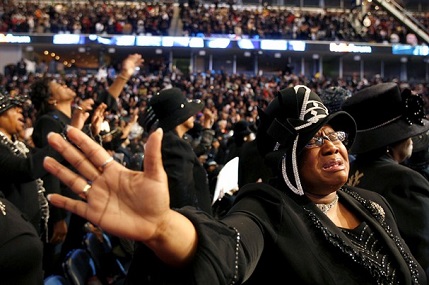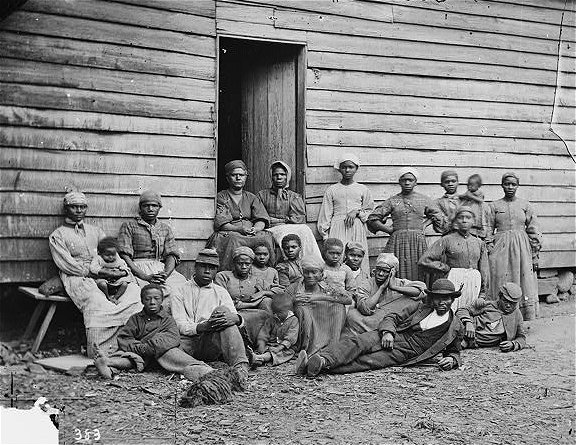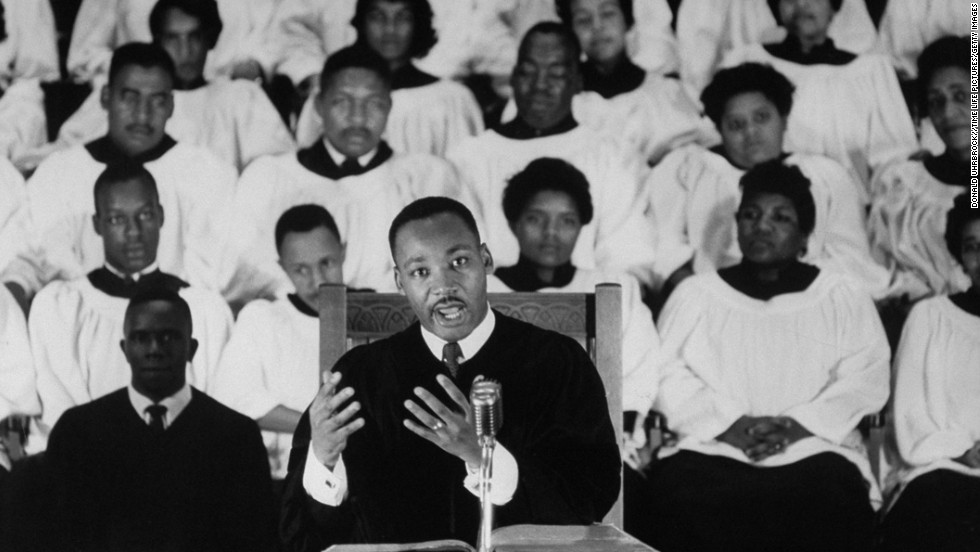 The term ‘the White Church,’ would be an out of place term in a discourse of the social evolution of church and church culture as we know it in Christian circles. However, the term the “Black Church” is not.
The term ‘the White Church,’ would be an out of place term in a discourse of the social evolution of church and church culture as we know it in Christian circles. However, the term the “Black Church” is not.
While the story of the Black Church parallels the experiences of African peoples in the United States, the struggles of these experiences - whether in slavery, Jim Crow or segregation - birthed an institutional Black Church over time that is unique and is arguably practiced nowhere else but in the United States. The fact is you won’t hear about a Black Church in Trinidad, Jamaica, St. Vincent or Nigeria, neither would you hear about a White Church in the United States. You might find a church with all White members, but there are no collective histories or narratives that seek to define that church’s whiteness.
While I know that it was the Bible and its Scripture verses that were used as tools of oppression to enslave an entire race of people, I take solace in the very same book and words of Jesus. Things may have been done in his name but the hearts of those who did those heinous things were far removed from him and his will -- he knew them not. Nevertheless, I cannot allow these matters to cause disruption of a life cultivated on faith and principles, declare it invalid and end up like a ship without a rudder or like chaff blown by the wind. The fact is faith and spirituality ground us and this I argue is one of the primary roles of the Black Church, as it existed in its early invisible forms to its present day, contemporary renderings.
I cannot imagine slavery, I do not want to imagine slavery, but slavery was probably hell on earth. The making of a slave included the dehumanization of the individual and most of those who crossed the Middle Passage and ended up in the Caribbean and the Americas were not Christians. In essence, it was a new religion being forced upon these people, which began with the ritual of name changing into a “Christian name” – in essence, a baptism.
 The dimensions of this forced religion were supplemented by a healthy diet of scriptures which urged slaves to obey their masters for theirs would be the kingdom of heaven, a place where all their present sufferings of this life and this condition of slavery would be over. One can only imagine the spiritual struggle of the newly enslaved. Did they comply publicly and secretly engage in forms of familiar worship? The evidence points precisely to this conclusion. The white church had already existed - perhaps not in name - but the slaves attended out of mere compliance because they knew of the ability to steal away.
The dimensions of this forced religion were supplemented by a healthy diet of scriptures which urged slaves to obey their masters for theirs would be the kingdom of heaven, a place where all their present sufferings of this life and this condition of slavery would be over. One can only imagine the spiritual struggle of the newly enslaved. Did they comply publicly and secretly engage in forms of familiar worship? The evidence points precisely to this conclusion. The white church had already existed - perhaps not in name - but the slaves attended out of mere compliance because they knew of the ability to steal away.
It was in stealing away that the enslaved were able to develop this authentic form of Black Christianity. It was literally in sneaking off to the forests in the middle of the night where they could worship freely and away from the watchful eyes of the masters. It was here the all-night prayer meeting began when slaves lamented because of their sorrows and sang songs to ease their earthly sufferings. It was here the Negro spiritual began where slaves sung in code and celebrated death. Yes, they celebrated death, not with tears but with joy because death was deliverance from earthly sufferings. A modern spin on this can be seen by how death is treated within Black Church culture today, terms like a “homegoing service” or “celebration of life” are used. Tears were reserved for when a slave was sold and the family was split apart on the auction block.
Operating under these circumstances at first made the church invisible, meeting secretly because it was against the law for slaves to congregate. Much less, should the slaves be exposed to the messages of freedom found in the Bible and a humanizing Jesus; life as they knew it would have changed.
In 1865, when slavery ended, the Black Church had to play a visible role. It was the go-to place for Black leadership as the newly empowered citizens gained political rights, including the right to vote. The natural choice for these early Black political leaders came from within the church. Despite the economic circumstances that prevailed after slavery that gave rise to the system of sharecropping which kept people poor, the Black Church was the only place Black people, especially Black men, were respected. You might be somebody’s ‘boy’ renting their land, but on Sunday - within the confines of the church and by now the larger community - you were the deacon, the elder, the trustee or/and sometimes the pastor. In the late 1860s and 1870s, as Blacks were elected federally and within their states especially in the South, the Black church was the incubator for Black leadership.

Fast forward to the middle of the 20th century, though African Americans continued to be marginalized politically and socially, the Church still remained a life force within the community. If one examines the Civil Rights Movement, the Church was the meeting place for the many mass meetings that were held and many civil rights leaders emerged from the Black Church, most famously Dr. Martin Luther King Jr.
The Black Church is a spiritual, social and political center for African Americans. It is a place of family but more so kinship, the type of family structure that existed during the times of slavery. It is a place where Christian worship is uniquely relevant to needs and vibrations of African people, whether in song, music or dance.
The Black Church will stay with us for some time come and, while there are many present day issues the Black Church itself must engage with to address, chronic problems in African-American family, life and culture, the Black Church is a force to be reckoned with as a dynamic institution. Its upcoming frontiers will include ventures that specifically address economic security and the wellbeing of the African-American.

